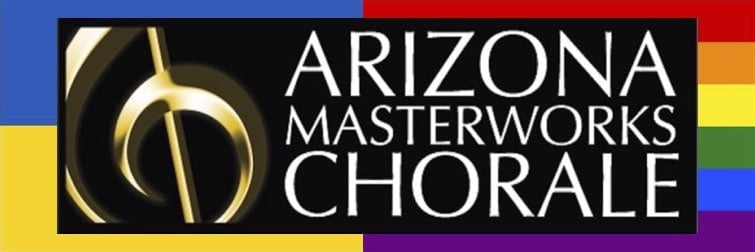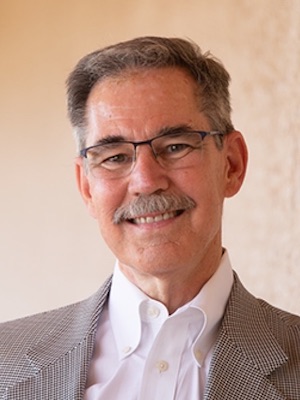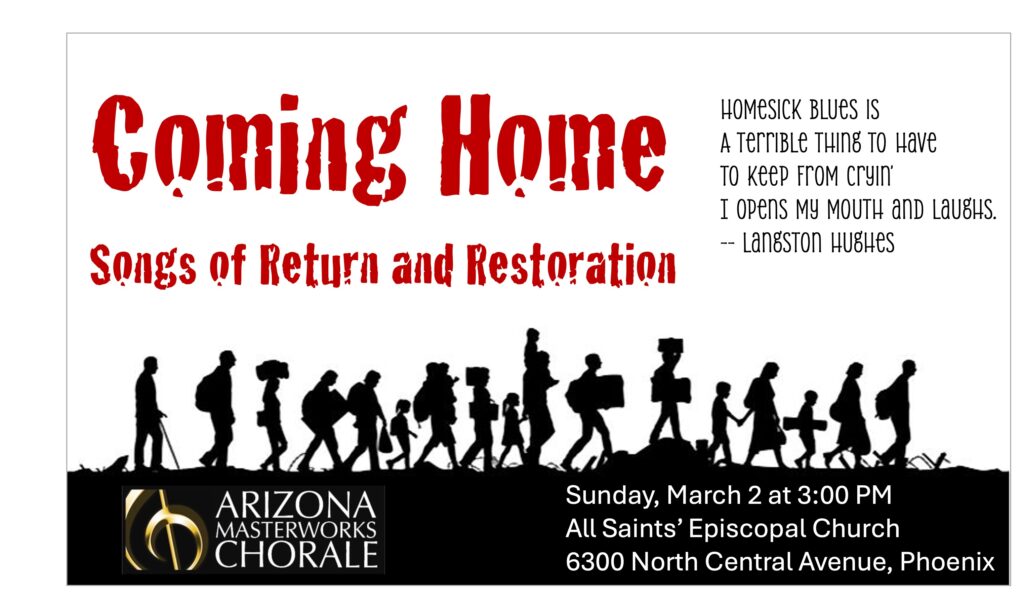The Music Director's Program Notes
The idea of “coming home” is so ingrained in all of us, that it pulls at our heartstrings with every mention. Whether we grow up in snow and ice, or a burning desert, it is still home and we are drawn back in thought, if not in fact. This program highlights this gravitational pull toward the familiar. Our current lack of housing for people, and the number of people searching for a safe place to call home, makes this a timely subject for thought. We hope that the program brings back good memories, feelings, and hopes, as well as a sense of common purpose in finding others a place to call home.
We open the program with a well-known theme from Czech composer Antonìn Dvořák’s “New World” Symphony. The setting of the words to this theme was done by one of Dvořák’s students, William Arms Fisher.
The melody is a perfect vehicle for the quiet, plaintive text. The melody alone has a kind of nostalgic feeling from Dvořák, feeling lonely here in America, longing to go back to his European roots. The text may have been a spiritual or gospel song and can be read as going home to heaven or simply going home to a place.
“Waiting” by American composer Howard Helvey sets a poem by John Burroughs. He has set the 6 stanza text in 3 verses for the choir; all on the themes of time, waiting, and nature. One man is moving against the tides; no time or space can stop the eternal forward movement. Once again, we have that magnetic attraction to move forward or return home.
The simple song “Walk in My Shoes” challenges disparate parties to find common ground and not be strangers; to try to experience another’s emotions and decisions and find understanding. Tomorrow’s answers are waiting if you’ll just try walking in my shoes. The arranger is André Thomas, a prolific arranger of spirituals who, oddly enough, started out disliking spirituals, but eventually became a champion of the songs. Niel Lorenz supplied the text of the work and is a frequent collaborator with Thomas.
“Coming Home” by Jay Althouse expresses the clear theme of this program in a simple text written by the composer. From distant pathways, with the stars as a guide, travelling sea and mountain; it’s time for the journey to end. I am coming home.
Early 20th Century poet Robert Frost was famous for his realistic descriptions of rural life. He collected four Pulitzer Prizes for his work as well as many other honors in spite of dropping out of college not once, but twice. Randall Thompson, another American and an eminent composer set seven of Frost’s poems in a collection called “Frostiana.” Today we present two of these pieces. The first, “Choose Something Like a Star” is an introspective thought process of holding onto the image of a star as a focal point of peace and stability when all around is pulling you away. Robert Frost wrote “The Road Not Taken” as a joke for a friend, the poet Edward Thomas. When they went walking together, Thomas was chronically indecisive about which road they ought to take and—in retrospect—often lamented that they should, in fact, have taken the other one. Frost creates multiple meanings, and finally comes to the conclusion that choice is inevitable. Thompson uses unison, or single melody writing, at the start of this piece. As it unfolds and voices take on different directions, we imagine the paths open to us and the choices we will inevitably have to make moving forward. Do we choose the path home or the path away?
The late composer Stephen Paulus was familiar to many of us here in Phoenix, as his works have been done by the symphony, the Phoenix Chorale, and many other groups in town. A gracious and quiet man, his writing in this piece sums up our theme once again. I left home. I wondered. is there a road home? Yes, with love in your heart, and the beauty of belonging, it will lead you home. He is greatly missed in our musical community, but his extraordinary output of more than 500 songs, instrumental works, and operas, lives on. Stephen used a pentatonic melody from an early songbook titled “The Lone Wild Bird” and asked Michael Dennis Browne to write the text. It was a commission for the Dale Warland Singers in 2001.
The Justice Choir Songbook is a collection of 43 pieces whose goal is a grassroots movement to engage in the empathetic, collaborative, and collective power of singing together to create change. All of the pieces examine topics of social justice or environmental justice and are given out free of charge to help create a forward movement. We have chosen a work by Abbie Betinis that can be performed in a variety of ways. There is a basic harmonic pattern which is the same as Pachelbel’s “Canon”. Then, there are layers and rounds that can be added at will. If the audience is willing, there is a melody for them. It makes a lovely montage of sound containing only the words “Love, all we need is love.”
Another early American melody, Bright Canaan, comes in a setting by Alice Parker, the arranger for the Robert Shaw Chorale. Alice has been a mover and shaker in American choral music for decades and this lilting melody takes the theme of coming home to mean heaven – where sorrows are no more. It has a particularly charming section where the men mimic timpani for a couple of bars under the melody sung by the ladies.
To take advantage of some of the lovely solo voices in the choir, we bring you “Danny Boy”, the ultimate coming home/yearning for a home song. Only the Irish could produce such pathos, longing, and sentimentality in a simple song. Our soloist, James Stirling, has the perfect voice to bring this song to life, along with an Irish Prayer.
Back to American folk songs then with “Shenandoah”, one of my favorites on this program. The arranger, Darmon Meader, is director of the New York Voices, which is actually a jazz vocal group. In this arrangement, he weaves a wonderful tapestry around a story of having to depart and longing not to, leaving love and place behind. He sets up the story with oohs sung as an introduction, and then presents the melody both with harmony and then as a single line with the men. The harmony does lean toward the jazzy, with a clear bright modulation in the middle of the piece to ramp up the drama.
Finally, after all the leaving, longing, hoping, praying, walking, and wishing for home, we end with the quintessential American do-wah piece by Irving Berlin “Blue Skies”. This foot-tapping number, a last-minute addition to the 1926 Rodgers and Hart musical “Betsy” that’s been recorded by artists from Al Jolson to Ella Fitzgerald to Willie Nelson, will bring a smile to our faces as we find love, sunshine, and blue skies shining on us.
O yeah…



